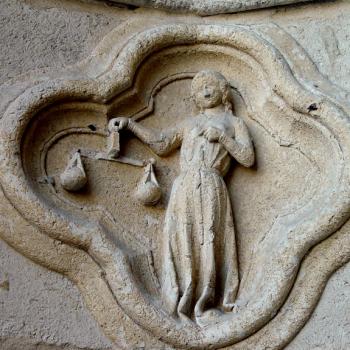
We have many temptations and sins which we fall into throughout our lives. While we can understand why many sins are wrong to do,others challenge us, as we do not understand why they are so bad. We might avoid them, but do so the same way we avoid breaking the law: we fear the consequences which come if we do them, not because we think we shouldn’t do them. This kind of approach to sin has led us to engage morality legalistically, making it extremely difficult for us to overcome sin in our lives.
Many of us who find ourselves concerned about sin tend to read all kinds of spiritual writings which suggest ways to overcome their influence in our lives. They tell us to engage practices like prayer, fasting, and almsgiving, when we find ourselves tempted to sin. Certainly, there is value to be found in such texts, as they have helped people confront their sins, but most of them do so only on a superficial level. As the focus is on discipline, on ways to counteract temptation, they engage the spiritual life on a very superficial level. They have us deal with the symptoms of our spiritual disease more than the root problem itself.
The real problem with sin, what makes all sin so bad, is that sin at its core is an affront against love. The ultimate means in dealing with sin, therefore, is to build up and exercise our ability to love. The more we love, the more we fight off the root evil behind sin, allowing us to become better at resisting temptation than if we just focused upon a particular temptation and tried to repress ourselves as a way to fight it off. That is, instead of focusing on particular sins, and having our thoughts and concerns focused upon them, trying to find ways to stop ourselves from sinning, we should develop what is good and true in ourselves, to develop the love which is in us, and in doing so, we will find that as our love grows, we will slowly counter sin in our lives. Instead of having to fight off and resist sin, love will give us a way to naturally say no temptation.
The more we embrace love, the more we will find ourselves developing our sense of compassion, and through such compassion, we will show more and more mercy towards others (and so ourselves). We can even learn to love ourselves, not in the self-centered, prideful form of self-love, but in the positive self-love that has us acknowledge our own good and recognize that good, insofar as it is good, is something to love. Thus, as St. Leo the Great preached, “Nothing is stronger, dearly beloved, against the wiles of the devil than the kindness of mercy and the generosity of love, through which ‘every sin’ is either avoided or conquered.” [1] This is the way which is often ignored. We often hear all kinds of sermons about particular sins, and how and why they are bad; we can be present with all kinds of spiritual disciplines which help us avoid particular sins, but if we do not hear alongside such presentations the positive approach which we need, that is, the approach of love and how love, when it is properly developed alongside mercy and generosity, helps us undermine the seeds of sin, we will find ourselves incapable of overcoming our sins. Eventually, after failing many times despite how hard we tried not to, we could end up in despair. We have not learned to accept mercy. We have not learned to see the good in ourselves and use that to give us hope. Thus, we do not need more sermons about sins; we need more sermons about love and how we should develop our love. This is not to say there should be no sermons which expose the problems of sin, but what value is there in them if they are given without giving the proper way to deal with it?
Everything which has been made has been made by God. There is nothing which stands on its own apart from God. All things are granted their existence through the will of God. By granting them existence, God has made sure all things have been given their own particular goods. Any and every good is loved by God, and so should be loved by us. When we approach others through love and mercy and compassion, we should seek to embrace them in relation to their good, helping them to preserve their own innate goodness. When we deny such love, when we let the poison of hate or pride or some other denial of love take control, we will sin. We will let the hermeneutic of unlove take control, using it as a way to find some excuse to harm the good we find in the other. This is why, when sin is being discussed, it is important to point out that sin, at its root, is the denial of love. We should be told to embrace love, both our love for God, but also for creation. We should be told that we love God through our love for creation, because the good which is found in creation participates in an presents elements of God’s goodness to us:
GOD created all things, because he is good ; and because he is good he also recalls to himself all things according to their capacity, that he may bountifully communicate himself to them. There is nothing that does not in some degree partake of God ; since it is from God that all have both their existence and their well-being. [2]
When we engage hate, we hate some element of the good. Through such hate, we find ourselves resisting the good, not only in the thing which we hate, but the good as it is also found in God, because that good in the thing which we hate participates in the good as it is found in God. In this way, hate turns us away from God. Embracing it makes us miss what should be the objective or goal our life, that is God. On the other hand, the more we embrace love, the more we will find ourselves loving relative goods, and through them, greater and greater goods, until at last, we come to love and connect with the absolute good which is found in God.
Love, in the end, will have us unite with God so that in our unity with God, our sins can be covered up and healed by God’s love. Yes, have to deal with the consequences of our sins, but our love will tell us how to do that, how to make satisfaction for the harm we have caused. Then, the more we embrace love, the more our love will help up detach ourselves from any and all attachments sin has placed upon us. Without such detachment, which can only be had with love, we will find ourselves always turning to sin, never letting it completely go. This is why, as Ficino understood, serving our fellow humanity, working for the common good, is a key feature of the Christian life, for it is a sign of love, the love which we need in order to enjoy eternity in beatitude. “Therefore, most humane man, persevere in the service of humanity. Nothing is dearer to God than love. There is no surer sign of madness or of future misery than cruelty.” [3]
[1] St Leo the Great, Sermons. Trans. Jane Patricia Freeland CSJB and Agnes Josephine Conway SSJ (Washington, DC: CUA Press, 1996), 329 [Sermon 74].
[2] John Colet, “Celestial Hierarchy” in Two Treatises on the Hierarchies of Dionysius. Trans. Joseph Hirst Lupton (London: Chiswick Press, 1869), 16.
[3] Marsilio Ficino, The Letters of Marsilio Ficino. Volume 1. trans. by members of the Language Department of the School of Economic Science, London (London: Shepheard-Walwyn, 1975; repr. 1988), 101 [Letter 55 to Tommaso Minerbetti].
Stay in touch! Like A Little Bit of Nothing on Facebook.
If you liked what you read, please consider sharing it with your friends and family!
N.B.: While I read comments to moderate them, I rarely respond to them. If I don’t respond to your comment directly, don’t assume I am unthankful for it. I appreciate it. But I want readers to feel free to ask questions, and hopefully, dialogue with each other. I have shared what I wanted to say, though some responses will get a brief reply by me, or, if I find it interesting and something I can engage fully, as the foundation for another post. I have had many posts inspired or improved upon thanks to my readers.













